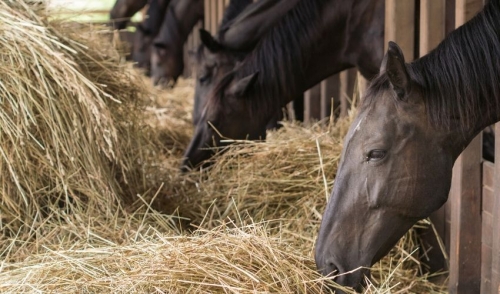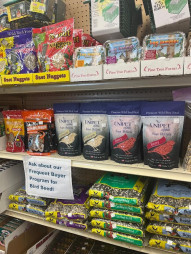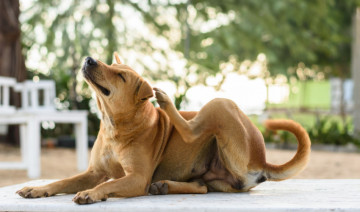Does Your Dog Have a Flea Allergy?
Fleas are a common annoyance to many dog owners, but these small pests can be a much bigger problem when a dog may be allergic to fleas. Recognizing if your...

Ulcers – sores in the gastric lining of the stomach or colonic ulcers in the hindgut – can make feeding a horse a proper diet more challenging. With conscientious effort and thoughtful care, however, you can ensure your horse has the appropriate nutrition without aggravating this often painful condition.
The exact causes of ulcers in horses can be difficult to diagnose, but it is a widespread problem among all ages, genders, breeds, and conditions of horses. Stress is believed to be a strong factor in the development of ulcers, and horses that generate excessive stomach acid can also have these painful sores. A high parasite load can exacerbate ulcers or make them easier to develop, and some bacterial infections are believed to play a part in ulcers. Determining whether or not your horse has ulcers can be challenging, but common symptoms include:
Because the symptoms of equine ulcers can be vague and could be associated with many different illnesses, it is important to consult a veterinarian for a proper diagnosis. This will also determine how many ulcers a horse may have and where they are located, information that can help direct the best course of treatment.
Even if a horse have ulcers, the animal still needs to eat to stay healthy – in fact, more eating can help improve ulcers because saliva has anti-acidic properties and can help neutralize acid in the front of the stomach where ulcers are most common. This doesn’t mean simply increasing the animal’s feed, however. Feeding a horse with ulcers must be done carefully to prevent aggravating the ulcers while still ensuring the animal receives the appropriate nutrition.
With the proper diet, many equine ulcers will heal on their own. Maintaining an ulcer-care diet can ensure the problems do not resurface and keep the horse healthy, well-fed, and ulcer-free.
In addition to a healthy diet, there are other steps that any horse owner can take to minimize the risk of even the most sensitive animal developing ulcers.
Ultimately, it is very common for horses to get ulcers, even with the best of care. By being aware of how ulcers are caused and taking steps to minimize the risk while offering a healthier diet, you can help ulcers heal and prevent painful recurrences.

We currently do not have any events scheduled.

Fleas are a common annoyance to many dog owners, but these small pests can be a much bigger problem when a dog may be allergic to fleas. Recognizing if your...
Comments